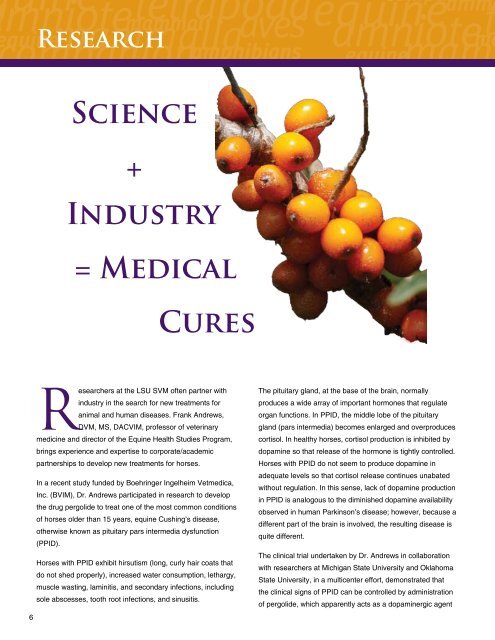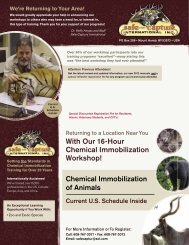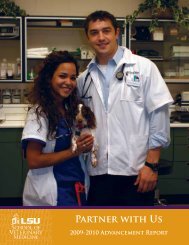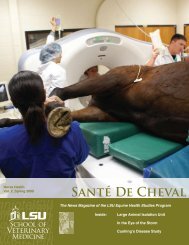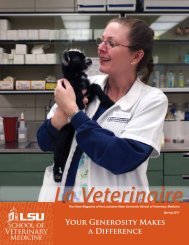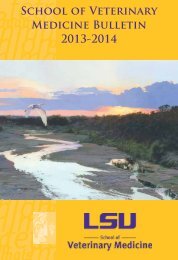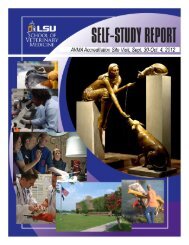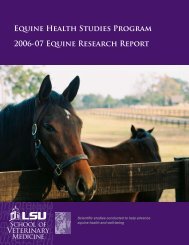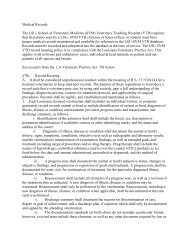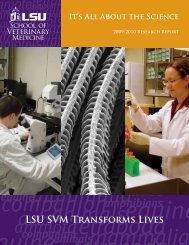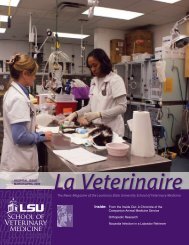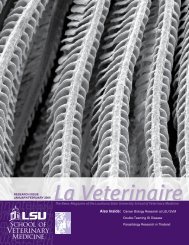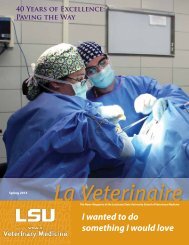Rockin' Round the Clock - School of Veterinary Medicine - Louisiana ...
Rockin' Round the Clock - School of Veterinary Medicine - Louisiana ...
Rockin' Round the Clock - School of Veterinary Medicine - Louisiana ...
Create successful ePaper yourself
Turn your PDF publications into a flip-book with our unique Google optimized e-Paper software.
Research<br />
Science<br />
+<br />
Industry<br />
= Medical<br />
Cures<br />
6<br />
Researchers at <strong>the</strong> LSU SVM <strong>of</strong>ten partner with<br />
industry in <strong>the</strong> search for new treatments for<br />
animal and human diseases. Frank Andrews,<br />
DVM, MS, DACVIM, pr<strong>of</strong>essor <strong>of</strong> veterinary<br />
medicine and director <strong>of</strong> <strong>the</strong> Equine Health Studies Program,<br />
brings experience and expertise to corporate/academic<br />
partnerships to develop new treatments for horses.<br />
In a recent study funded by Boehringer Ingelheim Vetmedica,<br />
Inc. (BVIM), Dr. Andrews participated in research to develop<br />
<strong>the</strong> drug pergolide to treat one <strong>of</strong> <strong>the</strong> most common conditions<br />
<strong>of</strong> horses older than 15 years, equine Cushing’s disease,<br />
o<strong>the</strong>rwise known as pituitary pars intermedia dysfunction<br />
(PPID).<br />
Horses with PPID exhibit hirsutism (long, curly hair coats that<br />
do not shed properly), increased water consumption, lethargy,<br />
muscle wasting, laminitis, and secondary infections, including<br />
sole abscesses, tooth root infections, and sinusitis.<br />
The pituitary gland, at <strong>the</strong> base <strong>of</strong> <strong>the</strong> brain, normally<br />
produces a wide array <strong>of</strong> important hormones that regulate<br />
organ functions. In PPID, <strong>the</strong> middle lobe <strong>of</strong> <strong>the</strong> pituitary<br />
gland (pars intermedia) becomes enlarged and overproduces<br />
cortisol. In healthy horses, cortisol production is inhibited by<br />
dopamine so that release <strong>of</strong> <strong>the</strong> hormone is tightly controlled.<br />
Horses with PPID do not seem to produce dopamine in<br />
adequate levels so that cortisol release continues unabated<br />
without regulation. In this sense, lack <strong>of</strong> dopamine production<br />
in PPID is analogous to <strong>the</strong> diminished dopamine availability<br />
observed in human Parkinson’s disease; however, because a<br />
different part <strong>of</strong> <strong>the</strong> brain is involved, <strong>the</strong> resulting disease is<br />
quite different.<br />
The clinical trial undertaken by Dr. Andrews in collaboration<br />
with researchers at Michigan State University and Oklahoma<br />
State University, in a multicenter effort, demonstrated that<br />
<strong>the</strong> clinical signs <strong>of</strong> PPID can be controlled by administration<br />
<strong>of</strong> pergolide, which apparently acts as a dopaminergic agent


